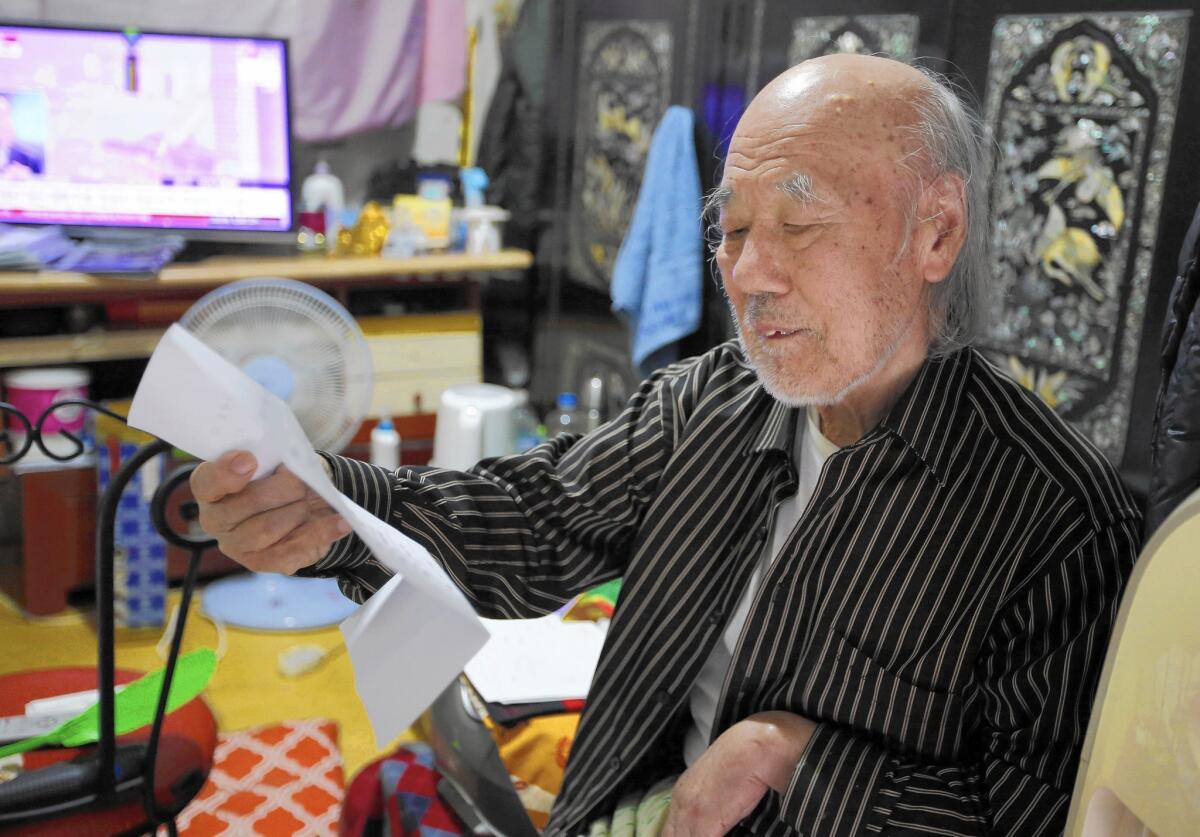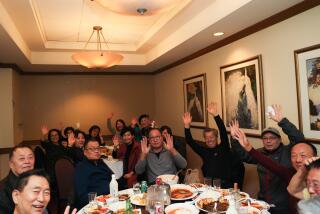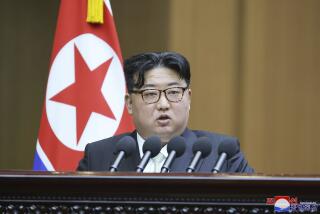Reunions of families split by the Korean War to resume

Kim Woo-jong spent his childhood frolicking with his three siblings in the mountains near their home in Gangwon, a province straddling the line that now separates North and South Korea. He dreamed of one day taking over his family’s ginseng farm, until that vision was upended by a war that would divide both family and country.
Kim’s 65-year separation from his family is finally set to end, albeit briefly. The 87-year-old has been selected as one of 100 South Koreans to participate in a three-day reunion with their relatives in the North. On Oct. 23 at North Korea’s scenic Mt. Kumgang, Kim is due to be reunited with his younger sister, his only surviving relative.
His face lined with wrinkles, Kim sports a light, silvery beard; problems with high blood pressure severely limit movement on his left side, making it difficult for him to walk. His sister is 85, and he knows that this will probably be their last meeting, as well as their first since 1950.
When the Korean War ended that year with an armistice — and the two countries were divided by a heavily fortified demilitarized zone — scores of families were torn apart. Negotiations for reunions started in 1971, but the first meetings of separated families weren’t held until 2000. The reunions have been held sporadically since then but get taken off the table whenever tensions rise between the two nations. About 66,000 South Koreans are registered with their government as having family members in the North, so only a tiny portion are selected each time.
The current round was initiated in August, when the Koreas reached an agreement to end tensions that saw an artillery volley across their border. These will be the first reunions since 2013.
The reunions tend to be highly emotional events. Over three days, relatives share meals and chat about their lives. The conversations tend to not get much past small talk, however — minders from the two governments keep certain topics off-limits. South Koreans are instructed to not inquire about the North’s rulers, for example, or say anything that could be interpreted as boastful of their superior wealth.
NEWSLETTER: Get the day’s top headlines from Times Editor Davan Maharaj >>
The division of Kim’s family began at the outset of the Korean War in June 1950. Kim fled south as North Korean and Chinese troops advanced toward his hometown. He walked hundreds of miles as part of a mass of refugees desperate to escape the fighting.
As a result, he, like countless others, lost track of parents and siblings. “It was a really chaotic time,” Kim said, as he sat on the edge of a cot in his one-room apartment. “I had no idea the war would last so long.”
Kim was in Seoul when combat ended in 1953, with no way of contacting his family to determine who had survived. He had no way of returning home, as the two Koreas were cut off by the demilitarized zone. Kim was left to start over alone in an unfamiliar city.
Nearly all the families registered with their government as having relatives on the other side are elderly, and the reunions offer a final chance to see their loved ones.
In a country where many wounds of war have never healed, analysts say the reunions offer a flicker of hope that North and South Korea can eventually end lingering tensions.
“The reunions are mostly important as a symbol of rapprochement, as they’re one of the only times that regular people from North and South Korea have direct contact,” said Kim Yeon-chul, a professor in the Korean Unification Department at Inje University.
Kim expected that he’d spend his life managing his family farm and had no career ambitions beyond that. Once the dust of war settled, he enrolled in a graduate program in economics in Seoul; it was a subject he thought would provide him with the knowledge he’d need to succeed in his new home.
After graduating, Kim fell in love and had a daughter, but never married and failed to find a stable job. He worked at a bar for a long time, he said. He refused to provide further details about how he supported himself and his family throughout his adulthood.
He says he tries not to think about what his life might have been like if he never fled what is now North Korea. “I’m a kind and obedient person, so I think I would have been more successful if I stayed there,” he said.
The two Koreas have gone in vastly different directions. The South has become Asia’s fourth largest economy and a functioning democracy; the North remains poor and ruled by dictatorship.
At the reunions, family members from the South usually prepare modest gifts of food and clothing for their relatives. Kim says he can’t afford to bring anything for his sister. Hanging his head low, he rummages beneath his mattress, saying that hidden somewhere in there is a little more than $600, the only money he has to his name.
Kim lives alone, but says he enjoys semi-regular contact with his daughter and a network of neighborhood friends. His tone and facial expression drag when discussing the details of his life, but he smiles with wide eyes when asked about his upcoming meeting with his sister.
“I’m so excited, I can’t even sleep these days,” he says. His sister is the baby of the family, and as her older brother, Kim grew up feeling a responsibility to protect her, until they were separated by war. “I just want to ask her how she’s living, if she’s healthy, happy,” Kim said.
Kim has a bit of hope that the South and North Korean governments will reconcile and the two siblings will see each other again.
When asked what his parting words for her might be, he says, “I’m going to say to her, ‘Let’s you and I both live awhile longer.’”
Borowiec is a special correspondent.
ALSO
In China, an insurance policy for good Samaritans who get sued
Chinese authorities deny passport to son of human rights lawyer
A Mumbai palace with a past is back in Indian hands, for a record price
More to Read
Start your day right
Sign up for Essential California for news, features and recommendations from the L.A. Times and beyond in your inbox six days a week.
You may occasionally receive promotional content from the Los Angeles Times.






